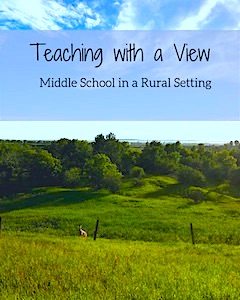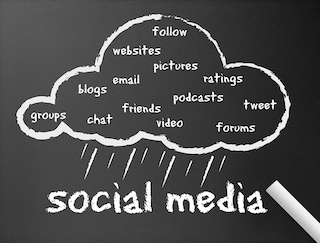Navigating the Waters of Teacher Social Media
 Social Media is both a blessing and a curse.
Social Media is both a blessing and a curse.
I see countless articles that are warning parents to be watchful of the time that their kids spend online. How do we (can we even?) protect them from the dangers that lurk out in the shadows of the internet.
Beyond those real threats, as my students have been reflecting on a lot in health class, social media tends to impact our students’ body image and can push them to set unrealistic goals.
On the other hand, from a professional perspective, there is a treasure trove of great ideas that can be found if we look in the right places. Teacher Social Media can be a great resource for growth and collaboration. But it too has its downsides.
As I reflect I have come up with a list of Pluses and Minuses and some steps that I believe can help us navigate Teacher Social Media’s troubled waters and achieve some smooth sailing towards more informed practice.
Teacher Social Media Pluses
► Ideas: The sheer volume of ideas (good and bad) that flow through the information super highway that is Twitter is astounding. I can simply put out a request, throw on some hashtags so people see it, and often within a few minutes ideas come flooding in. Of course there are many ideas that are not helpful (or precisely what we need) but that is where this beautiful thing called professional judgment comes in.
► Connections: Twitter has led to the most amazing connections of my teaching life. Earlier this year my active blogging and Twitter presence led to an invite to present at a conference during a breakout session. I was asked to co-moderate the weekly #g2great chat as well. I have cultivated some great “virtual” (and sometimes personal) friendships thanks to social media.
► Expanded Thinking: Twitter connections have also helped me to expand my thinking. I started my Twitter life following the most followed. The trending topics. It became overwhelming. I stepped away from all of those chats and started listening to other voices. I started following discussions like #disrupttexts and #cleartheair. I have written before about the #31DaysIBPOC blog Essay series organized by Tricia Ebarvia and Dr. Kim Parker – this was really was a turning point for me in thinking about how I should spend my time in the classroom and on social media.
► Share your Voice: Last year I started a Facebook group Talking Books, Teaching and Literacy. I wanted a space free of any talk of Accelerated Reader and Teachers Pay Teachers. It’s attracted almost 900 members and has been a great place to share ideas, discuss YA and other books, and all things literacy teaching.
Teacher Social Media Minuses
You may not agree with my list of negatives, but here are the social media minuses I see.
► Surface Conversations: Not all teachers use Social Media the same way and I understand that. But I see a large contingent who choose to only discuss and share topics that they feel comfortable in. A big example of this is the Kindness Movement. To be very clear, I am not saying that we shouldn’t be kind or encourage kids to be kind. What I am saying is that kindness is not a new concept, nor is it enough to overcome injustice in classrooms and schools. Talking only about “kindness” (who could be against that?) keeps us comfortable but avoids conversations focused on real change.
I have been told on more than one occasion that for some people Twitter is not the place to have conversations about race, equity, poverty and so on. They like to keep it light. I can see that, but where that becomes problematic for me is that the “light” in many cases is trying to be peddled as a cure-all or acceptable alternative for meaningful action. My question is where WILL we have these conversations?
► Not Giving Credit Where It’s Due: I think this is a huge issue in the field of education. I wrote about this in my post here at MiddleWeb calling out Teachers Pay Teachers. My thinking on this came about with the trend of creating memes with inspirational messages to share out for likes and retweets on social media – be it Facebook groups, Instagram stories or the Twitter timeline.

And this is not even the most egregious example. Theft of intellectual property and the publishing machine that is taking advantage of a market where teachers often feel they need to learn more have led to many educators’ work being claimed by others. This is especially true when looking at research and writing on equity and anti-racism issues, which are gaining interest on Teacher Social Media.
Recently an amazing educator, Lorena Germán, brought to my attention through Twitter that while there are educators of colour who have been doing work for many years around diversity in the classroom and the importance of students being able to see themselves in the texts they use, other educators with much less time and work in the field were getting the speaking and book deals.
One place where I think Education Social Media can help with the issue of credit due is by “passing the mic,” as Dr. Laura M. Jimenez put it once to me in a conversation. Teachers need to make sure that we are not just giving a nod to the source when we use others’ work but that we are suggesting the thought originators for the speaking gigs and book and article writing opportunities.
► The quest for Edu-celebrity status: This really is my biggest concern because I think in the end this hunger for celebrity is what leads to all the other concerns. When our quest for fame, for speaking gigs, for book deals, starts to dictate the conversations we are willing to have, I think there is a huge problem with equity.
If our star power becomes the focus, our students naturally are pushed to the side. We need to remember why we started this beautiful work, and if you started being a teacher so you could be a famous speaker and consultant…well, shame on you.
Steps for Social Media Success
► Stay true to yourself: You will get pulled in different directions, but if you stick to what Gravity Goldberg calls our core beliefs in Teach Like Yourself you will be able to manage the trickier spots.
► Follow and celebrate brilliance: This is easy. Find the educators out there who are doing the work. Follow them and amplify their voices. Through likes, tweets and shares we can curate a timeline that represents who we are. Remember retweets are an endorsement whether you post a disclaimer in your bio or not.
► Do not amplify mediocrity: There is so much noise out in social media, between people pushing books they claim will solve all your problems to teachers sharing terrible class activities. There are even educators who would exploit their students’ struggles to shine a light on themselves. These folks don’t need to be amplified.
Weathering the Storm
I love Teacher Social Media, but these waters are not ever truly calm. There are massive waves that if we are not careful will tip the boat. There are amazing educators to follow, and there are movements that are important and need to be amplified. I have mentioned some of them in this post.
My hope is that our professional judgment can help us through the storm that threatens to overtake the education system with platitudes and surface level work. I hope we will do more to assist educators who are taking risks on behalf of kids, who do the important work every day – whether or not they are in a social media spotlight – so they are not left to weather the storm alone.


































Your first words are so true. “Social Media is both a blessing and a curse.” Social media has so many “shades” that “weathering the storm is also so appropo!